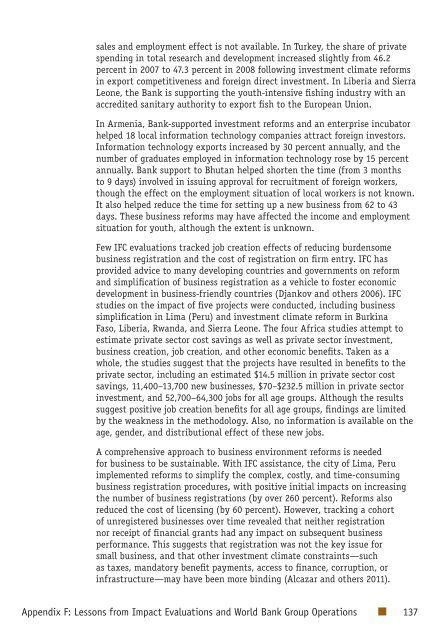Youth Employment Programs - Independent Evaluation Group
Youth Employment Programs - Independent Evaluation Group
Youth Employment Programs - Independent Evaluation Group
Create successful ePaper yourself
Turn your PDF publications into a flip-book with our unique Google optimized e-Paper software.
sales and employment effect is not available. In Turkey, the share of privatespending in total research and development increased slightly from 46.2percent in 2007 to 47.3 percent in 2008 following investment climate reformsin export competitiveness and foreign direct investment. In Liberia and SierraLeone, the Bank is supporting the youth-intensive fishing industry with anaccredited sanitary authority to export fish to the European Union.In Armenia, Bank-supported investment reforms and an enterprise incubatorhelped 18 local information technology companies attract foreign investors.Information technology exports increased by 30 percent annually, and thenumber of graduates employed in information technology rose by 15 percentannually. Bank support to Bhutan helped shorten the time (from 3 monthsto 9 days) involved in issuing approval for recruitment of foreign workers,though the effect on the employment situation of local workers is not known.It also helped reduce the time for setting up a new business from 62 to 43days. These business reforms may have affected the income and employmentsituation for youth, although the extent is unknown.Few IFC evaluations tracked job creation effects of reducing burdensomebusiness registration and the cost of registration on firm entry. IFC hasprovided advice to many developing countries and governments on reformand simplification of business registration as a vehicle to foster economicdevelopment in business-friendly countries (Djankov and others 2006). IFCstudies on the impact of five projects were conducted, including businesssimplification in Lima (Peru) and investment climate reform in BurkinaFaso, Liberia, Rwanda, and Sierra Leone. The four Africa studies attempt toestimate private sector cost savings as well as private sector investment,business creation, job creation, and other economic benefits. Taken as awhole, the studies suggest that the projects have resulted in benefits to theprivate sector, including an estimated $14.5 million in private sector costsavings, 11,400–13,700 new businesses, $70–$232.5 million in private sectorinvestment, and 52,700–64,300 jobs for all age groups. Although the resultssuggest positive job creation benefits for all age groups, findings are limitedby the weakness in the methodology. Also, no information is available on theage, gender, and distributional effect of these new jobs.A comprehensive approach to business environment reforms is neededfor business to be sustainable. With IFC assistance, the city of Lima, Peruimplemented reforms to simplify the complex, costly, and time-consumingbusiness registration procedures, with positive initial impacts on increasingthe number of business registrations (by over 260 percent). Reforms alsoreduced the cost of licensing (by 60 percent). However, tracking a cohortof unregistered businesses over time revealed that neither registrationnor receipt of financial grants had any impact on subsequent businessperformance. This suggests that registration was not the key issue forsmall business, and that other investment climate constraints—suchas taxes, mandatory benefit payments, access to finance, corruption, orinfrastructure—may have been more binding (Alcazar and others 2011).Appendix F: Lessons from Impact <strong>Evaluation</strong>s and World Bank <strong>Group</strong> Operations 137
















